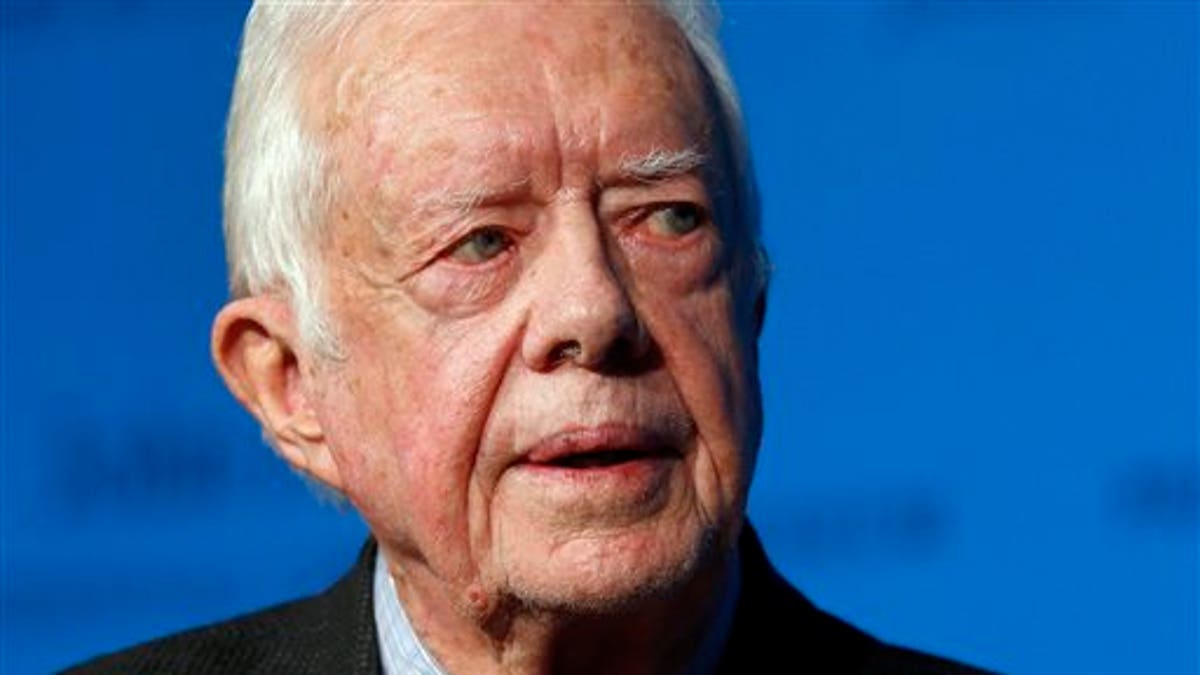
In this Thursday, Nov. 20, 2014 photo, former U.S. President Jimmy Carter speaks during a forum in Boston. On Wednesday, Aug. 12, 2015, Carter announced he has cancer and will undergo treatment at an Atlanta hospital. (AP Photo/Elise Amendola) (AP)
Determining what treatment to pursue for former President Jimmy Carter's cancer will depend on its type, its origin and factors such as age and health, doctors said.
Carter, 90, announced Wednesday that recent liver surgery found cancer that has spread to other parts of his body.
"I will be rearranging my schedule as necessary so I can undergo treatment by physicians at Emory Healthcare," Carter said in the statement released by the Carter Center in Atlanta.
The statement indicates that the 39th president's cancer is widespread but not where it originated, or even whether that is known at this point. The liver is often a place where cancer spreads and less commonly is the primary source of it.
Dr. Len Lichtenfeld, deputy chief medical officer of the American Cancer Society, said "there's a lot we don't know," but the first task likely will be determining where the cancer originated, which can help determine what treatment Carter may be eligible for. Sometimes the primary site can't be determined, so genetic analysis of the tumor might be done to see what mutations are driving it and what drugs might target those mutations.
"Given the president's age, any treatments, their potential and their impacts, will undoubtedly be discussed carefully with him and his family," Lichtenfeld said.
Age by itself does not preclude successful cancer treatment, said Dr. Lodovico Balducci, a specialist on treating cancer in the elderly at the Moffitt Cancer Center in Tampa. Much depends on the patient's "biological" age versus his actual years, he said.
"A man 90 years old normally would have a life expectancy of two or three years, but Jimmy Carter is probably much younger than that" in terms of his function, Balducci said. "If he tolerated liver surgery, I imagine he has a relatively good tolerance" to other treatments that might be tried. For example, Moffitt has developed a scoring system to estimate how well an older person would tolerate chemotherapy and the risk of serious side effects.
The first task is to determine whether the cancer is curable, "which is unlikely with metastatic cancer," or if it is possible to meaningfully prolong the life through surgery or other treatments, Balducci said. "Cancer in a 90-year-old is a serious problem, but that does not mean a 90-year-old cannot benefit from treatment."
Carter's statement said further information will be provided when more facts are known, "possibly next week."
Despite remaining active through the years, Carter's health has recently become the subject of speculation. In May, he was forced to cut short an election observation visit to Guyana when he developed a bad cold.
Carter also completed a book tour this summer to promote his latest work, "A Full Life," which includes his family's history of pancreatic cancer. He wrote in the memoir that his father, brother and two sisters all died of the disease and said the trend "concerned" the former president's doctors at Emory.
Carter wrote that being the only nonsmoker in his family "may have been what led to my longer life."
He announced Aug. 3 that he had surgery to remove a small mass from his liver. Carter Center spokeswoman Deanna Congileo earlier this month called the liver surgery "elective."
An Emory spokesman declined comment Wednesday.
Good wishes poured in on social media after Carter's announcement. President Barack Obama said he and first lady Michelle Obama wish Carter a fast and full recovery.
"Jimmy, you're as resilient as they come, and along with the rest of America, we are rooting for you," Obama said in a statement.
Vice President Joe Biden said he was praying for Carter, who is "a great man, always upbeat and optimistic."
Democratic National Committee Chairwoman Rep. Debbie Wasserman Schultz said her thoughts were with Carter and his family: "I wish him strength as he faces this challenge head on, as I am sure he will do with the same spirit with which he has always fought on behalf of others."
A Georgia peanut farmer who had been a state senator and governor of Georgia for a single term before running for president, Carter defeated Gerald Ford in 1976 with a pledge to always be honest. He ended up seeing a second term doomed by a number of foreign policy conflicts — in particular, the Iran hostage crisis — before losing in a landslide to Ronald Reagan in 1980.
He spent the decades since carving out a reputation for promoting such global issues as health care and democracy, often with his wife Rosalynn by his side. He joined the staff of Emory University and in 1982 established the Carter Center to promote those issues.
His new role as global statesman took him into places often shunned by other diplomats. Carter helped defuse nuclear tensions between the Koreas and monitored the first Palestinian elections. In 2002, he won the Nobel Peace Prize.
